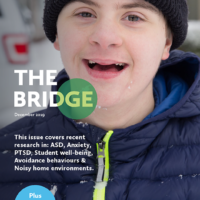Parental mental health
-

Paternal perinatal stress is associated with children’s emotional problems at 2 years
Open Access paper from the JCPP – “Rates of help-seeking among fathers is low, possibly due to conceptualising their own difficulties as stress rather than problems with mood”. Fiona L. Challacombe (pic) et al.
Read more -

Preventing anxiety in the children of anxious parents – feasibility of a brief, online, group intervention for parents of one- to three-year-olds
Participants were recruited through primary and secondary care psychological services and social media. Emily Palmer, Matt Woolgar, Ben Carter, Sam Cartwright-Hatton, Fiona L. Challacombe (pic)
Read more -

Mother’s and children’s ADHD genetic risk, household chaos and children’s ADHD symptoms: A gene–environment correlation study
Open Access paper from the JCPP – “Chaotic home environments may contribute to children’s attention-deficit hyperactivity disorder (ADHD) symptoms. However, ADHD genetic risk may also influence household chaos”. Jessica C. Agnew-Blais (pic) et al.
Read more -

ACEs – Adverse Childhood Experiences
Adverse Childhood Experiences (ACEs) are defined as situations that lead to an elevated risk of children and young people experiencing damaging impacts on their health and other social outcomes across the life course.
Read more -

Which disorders precede the development of mood disorders in young people?
Mood disorders such as bipolar disorder (BPD) and major depressive disorder (MDD) typically emerge in childhood or adolescence. Now, researchers in Switzerland, the USA and Canada have investigated whether certain other mental health disorders precede the onset of mood disorders
Read more -

Depressed mothers and their offspring differ in terms of health risk profiles and allostatic load
Allostatic load is essentially the “wear and tear” that accumulates in the body in individuals exposed to chronic stress. Because some patients with psychiatric disorders have a shorter lifespan than their healthy counterparts,1 some researchers have suggested that there might be a link between disorders such as depression and increased allostatic load.
Read more -

PCIT-ED seems to improve parenting behaviour and affect towards children with depression
Data from a new study show that parenting behaviour and affect improved after completing a dyadic parent–child treatment for depression in young children (aged 3-6 years).
Read more -

Boys and girls show different vulnerabilities to maternal postnatal depression
Findings suggest that prenatal anxiety and depression confer risk in different ways in boys and girls, and later work confirmed that there might be sex differences in the biological underpinning of psychopathology.
Read more -

December 2019 issue – The Bridge
Summaries include; if parental consanguinity predicts the severity of Autistic symptoms; study the transmission of intergenerational anxiety in families; systematic review into the effectiveness of available interventions to treat PTSD; the efficacy of teacher assessments vs exams to assess performance in UK schools; relationship between intolerance of uncertainty and extreme demand avoidance in young people with Autism; and how fluctuations in external environmental noise affect the developing Autonomic Nervous System in babies.
Read more -
Child anxiety symptoms affect mothers via an environmental mechanism
Intergenerational anxiety associations in families are well reported, but the underlying mechanisms of anxiety transmission are unclear. Now, researchers in the UK and the USA have conducted the first genetically sensitive study to explore the effects of genetic and environmental anxiety transmission in families during middle childhood.
Read more